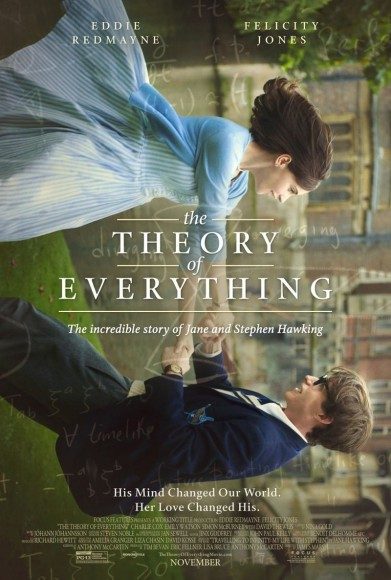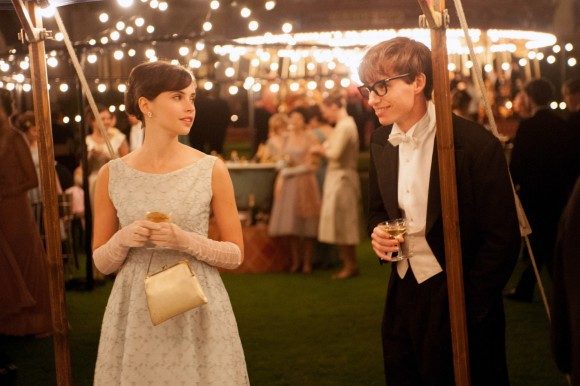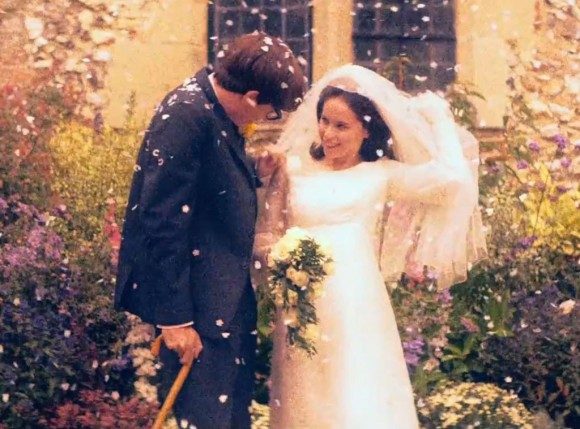If you’re looking for a Stephen Hawking biopic, a detailed document on the physicist’s life, theories, and various fields of expertise, you probably shouldn’t look at The Theory of Everything. James Marsh’s film is first and foremost a story about relationships – mainly Hawking’s relationship with his first wife, Jane – with little concern for science. So, does the film succeed on those terms? Well, some parts are truly exceptional, but they come with their share of problems.
One of Theory of Everything’s first and most important tasks was making Stephen and Jane’s romance believable, and thankfully it’s pretty successful. From their first meeting at university, to the birth of their first child, the relationship is one of small but intimate gestures, charming rapport, and fascination between two different-minded individuals – Stephen’s inquisitive mind is wrapped up in science (of course) while Jane prefers the arts. This charm and curiosity is presented through a serviceable, if indistinct script and solid delivery, plus excellent body language – more on that later – from the performers.
Where things get difficult, both for the characters and for the film, is the period which delves into Stephen’s worsening motor neuron disease, and the struggles the condition inherently brings to a marriage. While the struggles are there on screen, I felt their true potential impact was missing. Yes, we do get glimpses of the inconveniences increasing immobility brings – stairs are a bit of a chore, as we see multiple times – and Stephen’s occasional bouts of understandable melancholia along with Jane’s occasional and equally understandable frustration; still, I was left feeling the film was holding back. Maybe it was an effort to preserve Hawking’s dignity, but I can’t think of a moment where his life became unbearably difficult, or the man himself became difficult for others.
Actually, I can think of a low moment for Hawking, but it’s also one of the film’s lowest. In the middle of a dinner, Hawking excuses himself. At this point, Hawking can still get around on his own, but as I said before, stairs are a bit of a chore. In one of the many great instances of physical performance, Stephen struggles to push himself, on his back, up a flight of stairs, with his less-than-functioning hands. He, on his back, glances through the banisters and sees his wife happy and laughing without him. But not only does he glance at his wife, he looks up and sees his infant son separated from him by a child safety gate – because subtlety and symbolism apparently don’t go hand-in-hand. But not only is Stephen separated from his wife and child and having trouble with those stairs, dramatically sad (or sadly dramatic) music swells, just in case the audience didn’t get the message. Oftentimes when the film decides to show pain and suffering it does so with melodrama rather than simple (and more effective) human drama. Overbearing music and direction are frequently tacked on top of a well-executed performance.
And I do have to give Eddie Redmayne credit for delivering on what needed to be a solid physical performance. For the majority of the film, Redmayne had to play Hawking at periods when his disease rendered him almost completely immobile. It was a performance that relied heavily on facial expressions, especially during the third act wherein, after a tracheotomy, Hawking is more or less rendered mute. In those times (and there are, sadly, not enough of them) when the music is off (or toned down) and the scene is simple, the emotion is carried by the performers alone and The Theory of Everything truly shines. I can’t fault any of the actors here. Felicity Jones brings all the joy, confusion, courage, and frustration Jane Hawking needed. Maxine Peake also delivers a nice dose of energy and wit late in the game as Hawking’s nurse, Elaine Mason. David Thewlis is fine as Hawking’s encouraging physics professor, though not given much to do.
Speaking of physics, we come to another of the films weaknesses: science. We are essentially presented two stories here: one is about Stephen Hawking the scientist, the other about Stephen Hawking the husband. While they both would have made interesting stories alone, together they don’t really mix. Of course, you can’t make any kind of movie about Hawking without talking about physics, but physics is of no consequence to his personal life – here at least. Sure, we occasionally get the odd discussion regarding Jane’s strong religious beliefs and how they conflict with Stephen’s worship of an equation, but there’s no real depth to the discussion. In fact, after the film is done with Stephen in college, his scientific pursuits barely come up again, and when they do it seems like their only point is to remind us this family man with motor neuron disorder is also a physicist. Oddly, the titular “theory of everything” doesn’t have much of a place here.
The Verdict: 3 out of 5
The Theory of Everything has a real identity crisis. It really wants to be a somewhat sad love story about a husband and wife, while also trying to be a biography of sorts on the more publicly known husband. I guess you could say the movie is trying to make a point by juxtaposing public success with private struggles, but if so, it’s never fully realized – the love story takes center stage, and is (especially in the early parts) the more fully realized portion of the film. Stephen Hawking’s exploits as a physicist feel like an obligation rather than a necessary part of the story. That said, the film is still highly watchable for the performances alone, particularly Eddie Redmayne’s as Hawking. If anyone ever decides to make a proper feature-length Hawking bio, I hope they consider they getting Redmayne back.





